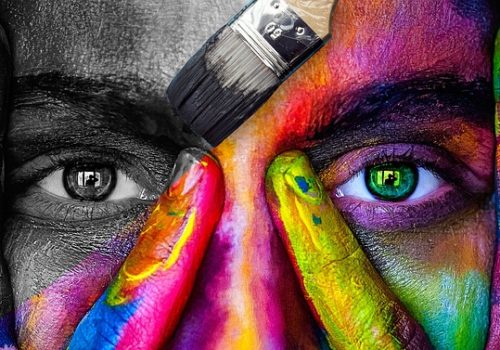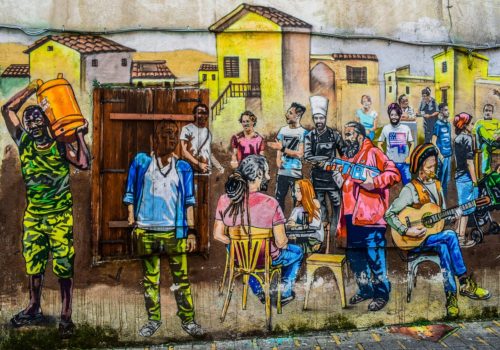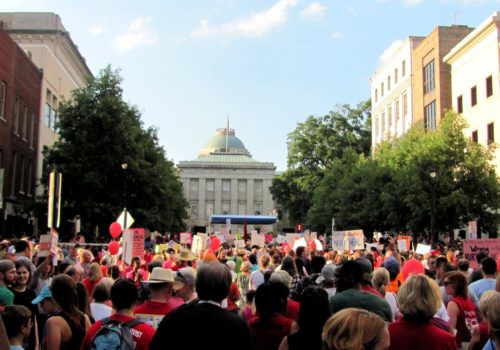Download PDF: Gerber, Telling Contested Stories
In August 2011, NPR ran a story about sexual orientation and psychotherapy, depicting what they described as an ongoing controversy regarding the possibility of changing sexual orientation.1 The story profiled Peterson Toscano, a performance artist and gay activist who spent many years unsuccessfully trying to change his sexual orientation through involvement in ex-gay ministries, and Rich Wyler, founder of the ex-gay organization Journey into Manhood, who claims to have become heterosexual through reparative or conversion therapy. The story, prompted by Michelle Bachman’s husband’s involvement in sexual reorientation counseling, depicted Toscano and Wyler as human faces of a long-standing debate within therapeutic circles over the efficacy of conversion therapy.
The story was highly controversial, and NPR received numerous complaints, the most frequent being with regard to the story’s depiction of the two options as equally valid alternatives, both scientifically and socially. The criticism was so intense that NPR ombudsman Edward Schumacher-Matos issued a statement responding to the anger and promising further investigation of what is clearly a freighted issue in American culture.
The day Schumacher-Matos issued his statement, I was asked by a friend to write a short piece on the controversy for the online magazine Religion Dispatches. As she knew, with the front-row knowledge friends often have, I have spent the last five years researching and writing a book on ex-gay ministries and Christian weight loss programs and had a lot of thoughts on the issue. I had shied away from earlier offers to write on this issue for Religion Dispatches and other websites because of the complexity of my feelings about the topic and inner conflict about where my accountability lies as a researcher who asked about, and heard, highly intimate, moving, vulnerable stories about a practice that I find personally problematic and politically dangerous. But after two summers of conversation in the Engaged Scholars Studying Congregations program, I felt I needed to take the engaged aspect of my work more seriously and try my hand at parsing my conflicts of accountability in a more popular venue.2
Engaged Scholarship and Contested Stories
Engaged scholarship has meant many different things to me in the course of my work, some of which come into stark contrast in the field and, perhaps more importantly, in writing. It means a commitment to scholarship that is engaged with important issues that have meaning to me and that can influence popular perceptions of freighted, controversial, and/or difficult issues. As someone with a background in social activism, it means a scholarship that does not take refuge in the neutral perspective the academic voice sometimes offers, but rather takes an explicit, self-reflexive perspective; a complicated, nuanced perspective, one that I hope can be more complicated and nuanced than many of the movements with which I have been involved, but it means taking a perspective nonetheless.
It also means real engagement with the people and communities that I study-which means taking their perspectives seriously, extending and receiving trust, and not using them or their stories simply for the purposes of supporting my perspective. Indeed, it means taking them seriously enough to change my perspective through the course of engagement-in conversation, in the shared tasks that fieldwork allows, in the common ground we can find on how to make the world a better place.
And it means thinking about how my work can be made accessible beyond the confines of academia and can engage a broader public in a thoughtful way. For many who hold an engaged perspective, it often means providing some kind of useful product for the people, groups, and institutions under study. For example, the Congregational Studies Team, who funded my work on engaged scholarship, thinks about how their work can concretely benefit religious congregations, regardless of theological or political affinity, and develops tools that are useful to congregational leaders and members.
For me, entering the evangelical world of ex-gay ministries brought some of those differing elements of engaged scholarship into tension. I entered this study as someone quite differently situated than those I studied. I am not Christian, nor am I gay, although I was often presumed to be so. I also entered as someone emerging from, and committed to, a range of more progressive perspectives related to feminism, gay rights, and progressive social change, more generally. I’ve written with two colleagues about the kinds of dilemmas that are generated for feminist and other politically-informed researchers when facing a tension between cherished feminist political commitments and the feminist methodological imperative of respecting the words and lifeworlds of research subjects.3 In writing on the NPR story for Religion Dispatches, I was faced with another tension that, for me, is heightened by a commitment to engaged scholarship: telling other people’s sacred stories in ways that balance respect with analytic rigor and complicated-but-as-honest-as-I-am-capable-of truth telling.
Arbitrating Truth
There are few stories more strongly contested in contemporary gay politics, on all sides of that debate, than those of sexual reorientation. Contemporary gay politics and gay identity, fueled by the movement’s early victory in having homosexuality declassified as a mental illness, is often founded on the notion that homosexuality is innate and not subject to change. For conservative religious people, the notion that God could not change whatever God wishes to change is inaccurate at best, and the evidence is found in narratives of “ex-gays”-people who claim to be healed of homosexuality either through faith alone or in combination with therapeutic interventions.
There is some expectation, from both sides, that academics studying these contested stories will somehow be arbitrators of their truth value. This is a position that I have been in, with which I continue to be deeply uncomfortable. To put it perhaps too simply, I want to keep my friends, maintain my values, and honor my research subjects. Sometimes these desires overlap; other times they clash and navigating them feels treacherous. In this case, the movements from which I emerge have a certain set of hopes regarding the support that academia can give to their positions, and the people who sincerely told me of their conversion stories had the same hopes and expectations. The engaged scholarship model can increase that tension by pushing academics to produce work that makes a difference, participates in active debates, and doesn’t obfuscate issues by retreating to academic language and publications. This is a good thing, but not an easy thing, at least not for me.
As a researcher in the ex-gay world, I heard many stories of sexual conversion, some of which were sufficiently incoherent or suspect so that they were easy to dismiss in the way that such stories so frequently are. One informant, for example, told me that he had become transformed fifteen years ago when he first became engaged with a ministry, but later he said that it had only been a year since he stopped being sexually involved with men. Others stories were more ambiguous in terms of conversion claims, including a number from people who had never had homosexual sex or a homosexual relationship but claimed healing. Their lives changed in some ways as a result of ministry engagement, but their sexual lives did not. There were other stories, though, that were not subject to dismissal, stories of those who have faithfully abandoned sexual activity with people of the same sex in order to adhere to their religious commitments, those who have made heterosexual marriages work in a context of ongoing struggles with homosexual desire, and those who have knowingly made a sacrifice of their desires and whose lives have changed as a result. The change these informants experienced were not the changes the ministries claimed, but their lives were changed nonetheless. A struggle I had in writing a book about these ministries was laying down my own cards in relation to my understanding of what these stories mean and what their truth value is. Caught between the voices of people who had shared hours of their time and unguardedly told their stories to me, knowing fully that we did not share perspectives on what those stories meant, and the visceral sense of how those kinds of stories get used to fight back against the kinds of social, political, and theological gains for gays and lesbians that I fully support, I hoped to take the academic’s way out and obscure my perspective in nuances, caveats, and hundreds of pages of text that no one would read that carefully anyway. But the call to engaged scholarship made that an unsatisfactory response. Two days before I sent in the final manuscript, I rewrote the conclusion, trying to say as clearly as I could that while the use of those stories is often duplicitous or cynical, some of the stories themselves were sincere and needed to be taken seriously by thoughtful critics of these movements. I had to fight many voices to say that-those of imagined gay activists calling me a traitor (some may), those of academics saying that taking so clear a position violates ideas of objectivity or non-judgment (some may). But one thing engaged scholarship means to me is returning the trust my informants showed in telling me their stories with honesty about my own grappling with those stories, even when that honesty is complicated, incomplete, and unsatisfying. It means refusing the privilege of academia to assume a more authoritative voice and making myself vulnerable in my own judgments.
The Religion Dispatches article made me do so in a much more condensed, much more widely read version.4 Writing it made me nauseous. (Writing almost always makes me nauseous.) But I chose one of the most compelling ex-gay stories I had to frame the piece. It was an example, to me, of taking an ex-gay narrative that I trusted and finding out what I could learn from it. Leonard had been involved in an ex-gay ministry for about five years, after twenty years in a very strict fundamentalist church and in a long-term affair with another church member. He told me how freeing it was for him to go from that community to one in which he could be honest and forthcoming about his sexual desires, where he could examine their source without shame and develop the kind of closeness with other men that he had always desired. Listening to him, I was convinced that the ministry did not do him harm, but, in fact, did him good, and that denying that for the sake of my analysis would be an act of symbolic violence against him on my part.
I used the story to argue that the position that some are now trying to take, that some people caught in a conflict between their religious commitments and sexual desires will prioritize their religious commitments and should not be denied support for that choice, is a plausible one, and that, in some circumstances, I might take that position myself. But I also took the position that that argument should not be made in a historical, political, or theological vacuum and that these stories need to be told in the context of the historical excesses of interventions into homosexuality; the political struggles on the part of gay, lesbian, and bisexual people to tame those excesses and carve out a socially legitimate place for themselves and their loves; and the ongoing political efforts, largely by organizations that continue to promulgate reparative therapy, at curtailing that space. I tried to honor Leonard’s story by emphasizing that I believe him to be a truthful informant, and that belief has forced me to re-think some of my own assumptions about ex-gays and ex-gay ministries, while still problematizing the practice that he found helpful but of which he was not uncritical.
I’m sure that some people will think less of me for the position I took in that article for a range of reasons: for legitimizing any aspect of the ex-gay narrative, for not being more suspicious of Leonard’s claims, for asking whether the victories gays and lesbians have achieved are sufficient to tolerate the possibility of a not-entirely-negative ex-gay experience. But I’m glad that engaged scholarship calls me away from hiding my positions in the frequently hedged language and frequently obscure publications of academia. It does, in fact, help me feel more engaged with the world. And it makes me feel like I am doing what I can to match the kind of vulnerability in disclosure that many of my interview subjects shared with me, even when we disagree.
Notes
- Alix Spiegel. “Can Therapy Help Change Sexual Orientation?” Morning Edition, August 1, 2011.http://www.npr.org/blogs/health/2011/08/01/138820526/can-therapy-help-change-sexual-orientation.
- The Engaged Scholars Studying Congregations program is a fellowship for early career scholars working on research related to congregations. It is sponsored by the Congregational Studies Team. For more information see http://hirr.hartsem.edu/about/cs_project_team.html.
- Orit Avishai, Lynne Gerber, and Jennifer Randles, “The Feminist Ethnographer’s Dilemma: Reconciling Progressive Research Agendas with Fieldwork Realities,” Journal of Contemporary Ethnography(19 September, 2012), http://jce.sagepub.com/content/early/2012/09/17/0891241612458955 (accessed January 31, 2013).
- Lynne Gerber, “Ex-Gay Conversion Therapy: Choosing Religion Over Sex.” Religion Dispatches, August 8, 2011.http://www.religiondispatches.org/archive/sexandgender/4974/ex_gay_conversion_therapy__choosing_religion_over_sex/.





